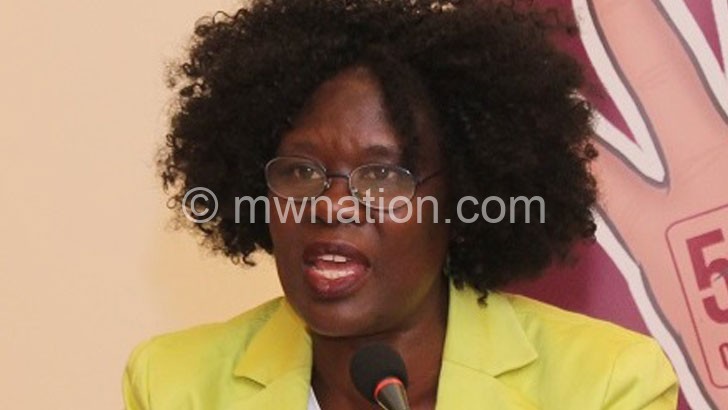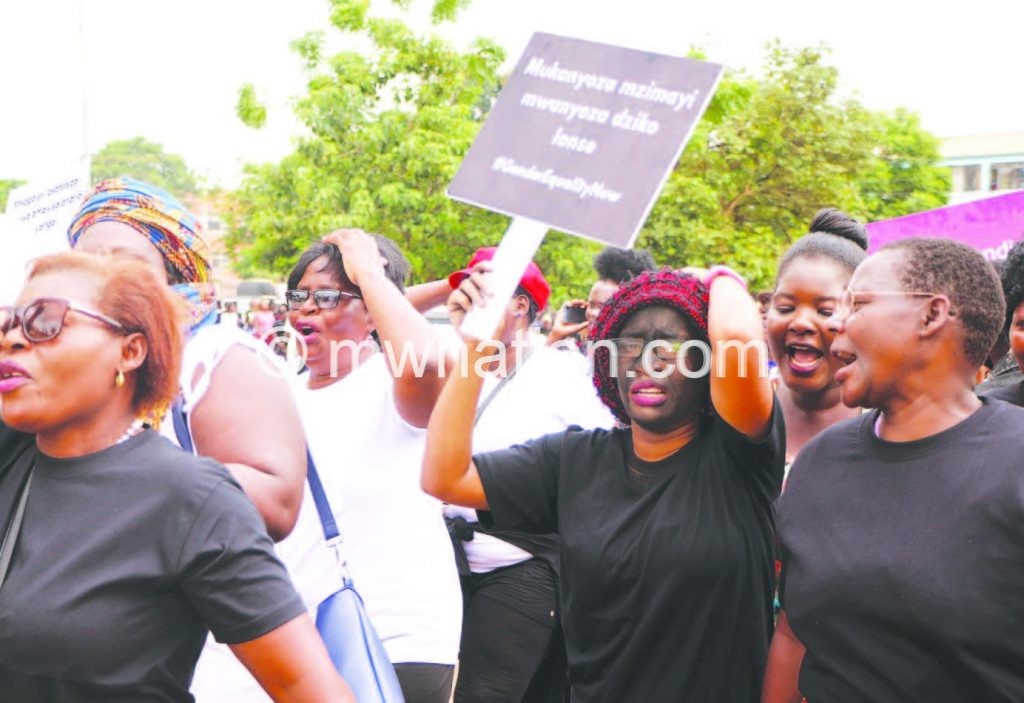Women to protest against gender imbalance
Barely after clocking 100 days in office, the honeymoon is over for President Lazarus Chakwera’s Tonse Alliance administration as it faces its first major nationwide protests tomorrow.
The demonstrations, organised by the Women Manifesto Movement comprising various women empowerment civil society organisations (CSOs), are in protest of Chakwera’s failure to fulfil the Gender Equality Act (GEA) requirement of 60:40 representation of either sex in public appointments.

While the GEA stipulates not less than 40 percent and not more than 60 percent of either sex in public service appointments, out of the 54 completely filled boards, only 11, representing 20.37 percent, comply with the law.
In an interview on Wednesday, one of the demonstration’s organisers Barbara Banda, who is also Non-Governmental Organisations-Gender Coordination Network (NGO-GCN) chairperson, said their intention is to raise awareness, encourage dialogue and see more women appointed into public institutions.
She said: “We are compelled to demonstrate because it is our right. We want to mobilise the women’s movement to make a stand against systemic discrimination in public appointments.
“Our ultimate objective is that we get heard. We want it clearly known that we are unhappy.”

She said, they as women, expected the new government to run the country by considering the gender equality opportunity factor particularly in public service appointments.
The appointments by Chakwera, announced in press statement signed by Secretary to the President and Cabinet Zanga Zanga Chikhosi, only has nine over 60 boards chaired by women.
On Monday during a special weekly briefing at Kamuzu Palace in Lilongwe, Chakwera said, he will achieve the 50-50 representation during his term as it will be a step-by-step approach.
He also claimed that there are few women who are well-qualified, challenging journalists to provide him with names of qualified women to make such appointments.
But when asked on Wednesday, on what qualifications Chakwera is looking for in women, presidential press secretary Brian Banda asked for more time to consult.
Efforts to speak to Minister of Gender, Development and Social Welfare Patricia Kaliati on her reaction to the planned protests and whether she has engaged the President on these issues proved futile, as her phone could not be reached on numerous occasions.
Meanwhile, political and governance commentators, including gender activists, say by mobilising themselves for such a major protest, the women are now rising to demand their rightful places in society.
In an interview on Wednesday, gender and governance consultant Wezzie Moyo described Chakwera’s sentiments that there are few qualified women in the country as lacking merit.
She said: “He [Chakwera] cannot reach that conclusion as if the process of getting people into boards was competitive by way of advertising as it was simply by appointment. Definitely, using that process, the appointing authority would not capture the whole range of the spectrum of qualified women in the country.”
However, on the demonstrations, Moyo said it would have only been right to proceed with them if all avenues of negotiations were exhausted as Chakwera indicated that he is open to discussing the matter further.
She said the President has only been in office for a little over 100 days; hence, should be given the benefit of the doubt.
Moyo, however, said since demonstrations are a democratic right, there is no problem in doing so.
On his part, politician-cum-commentator Humphrey Mvula said since the board appointments may be hard to reverse, the leadership must try to engage with the women.
He said: “I guess the President and his Vice-President [Saulos Chilima] are fine gentlemen whom the aggrieved groups can engage for a better tomorrow because it is difficult to reverse the various board appointments.
“However, since demonstrations are a constitutional right, I doubt if it can undermine the ability to govern.”
University of Malawi’s Chancellor College political science lecturer Ernest Thindwa said the appointment of women into positions of influence should not overlook the quality and competence factor.
He said: “While appointing women in positions of influence is critical to social cohesion and national development, it should not be at the expense of quality and competence.
“We need to move away from the quantitative approach to achieving equality and concentrate on measures which can increase both the quality and quantity of a pool of women from which we can tap talent to serve the country.”
Both Thindwa and Moyo also said the development does not mean the Tonse Alliance administration is losing touch with women in the country, who constitute the majority of the country’s population and, combined with the youth, formed over 60 percent of voters in the May 21 2019 Tripartite Elections.
The demonstrations are scheduled for the three major cities of Blantyre, Lilongwe and Mzuzu.
According to a notice on the demonstrations, women in Lilongwe will march from Kamuzu Central Hospital to Parliament while in Blantyre the march will start from the Old Town Hall through Chipembere Highway to Kamuzu Stadium.
In Mzuzu, the demonstrations will start from Katoto Secondary School ground to Mzuzu City Council. In all the areas, the demonstrations are expected to start from 10am to 1pm.
Last week, the Malawi Law Society (MLS) also expressed concerns on the low representation of women in the various boards.
In a memo, MLS honorary secretary Martha Kaukonde said the Attorney General needs to advise the government on implications of the legal oversight and for government to make amends promptly given the clear contest of Section 11 of the GEA.





